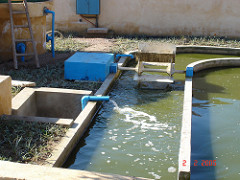
A £1.25 million project will research the role of managing antibiotic use in combatting anti-microbial resistance (AMR) transmission. It will use the novel wastewater sampling technique UKCEH developed in response to the COVID-19 pandemic. This is the first time this technique will be implemented with populations outside the UK and used to target non-COVID health questions.
A novel wastewater sampling technique UKCEH developed in response to the COVID-19 pandemic is now being used to research the role of managing antibiotic use in combatting AMR transmission. This is the first use of this technique to target non-COVID health questions.
It is thought that the transfer of antibiotic residues and antibiotic resistant bacteria into the environment, and subsequently into animal drinking water, may have an effect on the transmission of resistant bacteria and their resistance genes back into the human population.
The project – Antimicrobial Stewardship in Hospitals, Resistance Selection and Transfer in a One Health Context (STRESST) – will determine the effects of hospital-wide antibiotic use programmes on the numbers of susceptible and resistant bacteria in a hospital in Malawi. The goal is to use wastewater surveillance to provide insights into the efficacy of antibiotic management programmes and the control of antimicrobial resistance in patients.
Read more...







